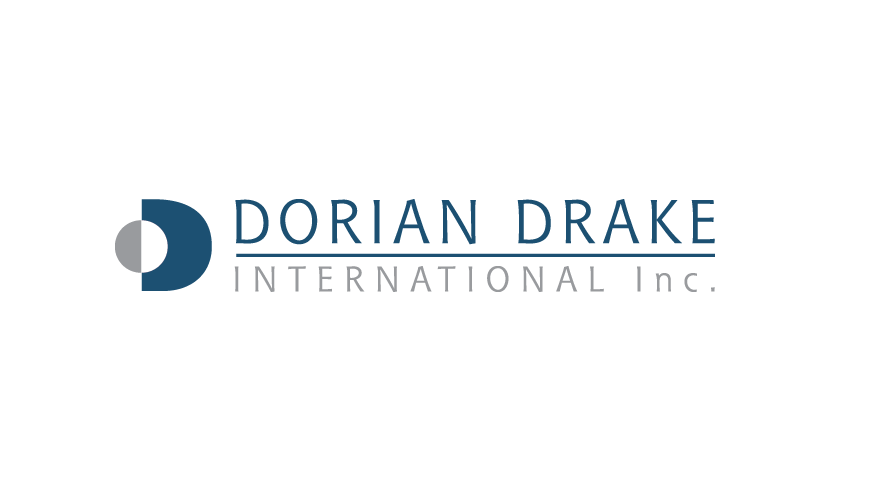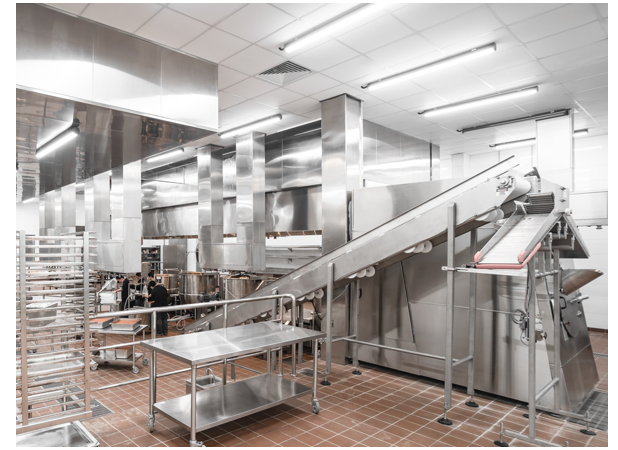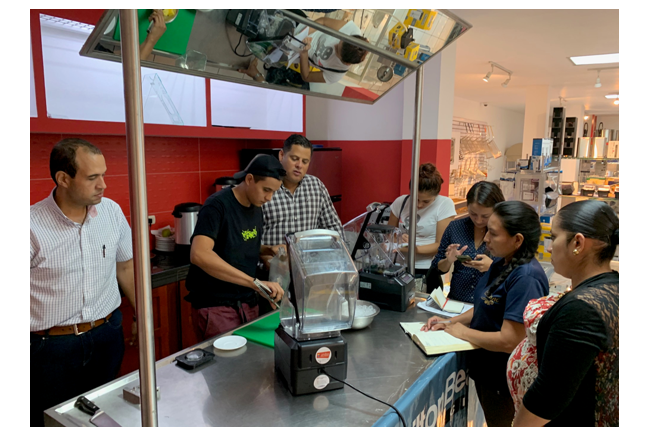We recently sat down with Juan Acosta and Ricardo Curi from Dorian Drake International to discuss the history of this dynamic global company and why they trust Arctic for all of their cooling needs.
If you don’t mind telling me a little bit about yourselves, the Dorian Drake story, and how you came to your position at the company?
Juan: My name is Juan Acosta; I am a chemical engineer from Colombia. I joined Dorian Drake almost 19 years ago. Originally, I joined a different product division and then I ended up being a regional manager for Latin America in Foodservice. In September 2019 I was appointed as a Foodservice group manager; I am based in New York, and I have 12 people working with me in Foodservice.
Ricardo: I am Ricardo Curi, and I am originally from the Dominican Republic, also known as the little island in the Caribbean. I have been with the company for 15 years. I have a bachelor’s degree in business administration, and I started the company as a sales coordinator. I worked to become a sales manager and then I became an area manager; currently I am the regional sales manager for Latin American. I have the luck of having two amazing colleagues to work with, Nara Vallarino and Patricia Garcia, who cover other parts of the region with me. I work under the supervision of Juan Acosta, who just happens to have been my boss for the last 15 years.
Juan, would you mind expanding on how the company got started? How did this thing get from an idea to now this international component, which is very well established, covering these huge territories.
Juan: Our founder, Ed Dorian Sr., in 1980 established Dorian International as an export management company representing U.S. foodservice equipment manufacturers in the Middle East. He was joined by his son, Ed Dorian Jr., in the early 1980s, and together they embarked on a strategy to expand globally. While doing so, the Dorians in 1985 acquired another N.Y.-based export management company, Drake America, which represented manufacturers internationally in other product categories—hardware, automotive, and industrial—resulting over time in the unification of the company’s corporate identity as Dorian Drake International. In 2002, the company adopted a business methodology called “Open Book Management,” which is still utilized today. We operate as an open book company where people see and manage all aspects of the company financially. In 2012, Ed Dorian Jr. launched an ESOP, which granted partial ownership of the company to its employees. In December of 2021, Ed completed a transaction making the company 100% employee owned.
How does your team view the international markets for Walk-in potential? While COVID certainly had an effect, the demand seems resilient and while shifting in products to an extent, it is alive.
Juan: The way I see it is that, luckily the market came back and now there is a big demand. Supermarkets and C-Stores are expanding, and obviously walk-in coolers are an integral part of this market segment. There are some challenges, dollar strength and variables like that, but the demand in Latin America is coming back and we see walk-in coolers playing a big role in that segment.
Ricardo: We see it as a great opportunity. For us, being able to discuss the advantages and the quality of the product with potential buyers is huge. We are able to sit down with them in their offices and that puts us in a very competitive position, compared to other manufacturers.
There’s a lot of talk in regard to the global economy and how consumer sentiment is being affected. What are your thoughts around customer communications and how to provide value and peace of mind to the end user?
Juan: I believe speculation will always be on the table. There is always going to be something that we are unsure of when it relates to the future. For me, it is key to work closer with the customers, because that gives us the opportunity to talk about the products that we represent and the features that they possess. We want to explain to the customer how making an investment will yield good ROI’s. Being closer to the customer, developing that relationship, is critically important to us.
Ricardo: Being honest is important! I know it may sound simple, but it is a very strong word. Being transparent with our answers, with what we can offer, what Arctic will offer them, goes a long way when managing expectations that customers have for us. We believe that if we are up front with what we can offer and the situations we are facing, the whole process will be much smoother for everyone involved.
How do you see the walk-in market, specifically from a strategic approach? In terms of price, quality, or even technical features, what makes the sale go in your opinion?
Juan: Nowadays more than ever, waste savings are key. In the refrigeration industry, you cannot compromise quality or durability. When you buy low-cost products, you end up having to pay for things such as repair, maintenance, and time invested. It is important you reduce waste as much as possible. Regarding what makes the sell go, promoting a quality product with prompt technical support professionals that are efficient and provide flexibility when dealing with customers. Those are the most important pillars when you are selling.
Ricardo: I also believe that it is going to be a combination of several factors. I would definitely say that customer relationships and technical support are two big components. I would also say that, especially for markets like Latin America, price is going to be an important factor for customers. It will not be everything for them, but it is an aspect that we need to keep an eye on, especially when we have a lot of local competitors trying to make a less quality product.
How do walk-ins differ from other products you represent? What would you like to see improved in walk-ins from a design or functionality perspective?
Juan: Walk-in’s are a unique category itself, but in our case, it fits in the market segment that we go after. We are focused on going after places like supermarkets and convenience stores. We promote and sell heavy duty equipment and we do it with independent restaurants, chain supermarkets, convenience stores, etc. We also go after ghost kitchens, which is a concept that became stronger during and after the pandemic and is something that we focus on as well. For all these reasons, walk-ins are a great complement to our product portfolio.
Ricardo: I believe that a lot of the distributors outside the United States think that walk-in coolers are very complex. It can be complex, yet our jobs are to make our distributors understand that this is an additional income that they can generate. They can have the tools, our support, and even tech support to navigate this intricate product. We can grow their businesses, and this can be a new category that they have never explored before. That is something that could add a new perspective to the business.
What else does Dorian Drake do that gets you excited? What other products do you sell that you would consider yourselves experts in? Do you have any other major projects that you’ve worked on that may not be walk-in cooler related?
Juan: Securing projects, landing a high impact chain, expanding and growing new territories makes me excited and it is something that I focus on with my team. We do represent several brands with small appliances and heavy-duty equipment that are related to voltage and electrical environments. In those environments, we need to understand space and the electrical components. It is not something that a regular salesman might understand; we also need to understand how important it is to accommodate customer space, understand how to approach a chain, hospital, supermarket, etc. For instance, in a convenience store you need to understand that there are a lot of products to sell, yet a limited amount of space. We work with the consultants, attempt to understand their verbiage and mindset, which is a different conversation than one we may have with a distributor. One thing that differentiates our team from others is our persistence. We know that landing projects does not happen in one or two months. We know the importance of following up and working with the factories to make sure they are in sync with our distributors or customers. That provides confidence to the customer, so those are points that we rely on or promote in order to work with heavy duty equipment.
Ricardo: We also believe in constant training; I would venture to say that it is one of our main pillars. We like to get our hands dirty! PowerPoint and zoom meetings are great, but in the end it is important to know how the operator is going to use that equipment or what impacts are we going to make in their operation? How is it that we are going to affect their performance? What we look for is to try and bring value added to the relationship.
Ricardo, would you mind expanding on a short story where all that had to come into play on a job? Where you had to get your hands dirty and had to engineer, make good use of the space, and work your way through it?
Ricardo: Our goal is always to provide better approaches or procedures to a customer’s current situation. One example was when a local chain was preparing to launch their frozen coffee program. When we looked at their recipes, our experience with previous launches in other markets allowed us to provide suggestions that worked specifically for them.
Juan: Talking about doing the dirty work, I just want to throw an example in the mix from last year. After seven years of working with the Latin America team, we were able to land a big important chain in Mexico called OXXO, a convenience store. Landing that account took seven years of persistence, seven years of visiting the customer, the factory, and understanding the competition. Sometimes there is an element like a ceramic element or an electric coil that does not work. Getting involved in that aspect is very important, because as salespeople we need to understand that when you talk to the engineer or the R&D guy at the chain, you need to understand the language and be able to give your perspective as well.
Ricardo: We get involved a lot into the strategic process of the company and our customers. We need to know which of our products is in their market. How much do we represent in their portfolio? How are we going to gain market share? Which actions are we going to be developing? It is a combination of several aspects. It is not just as simple as selling a product, there is a lot of thought behind it. Different products have different stages and different approaches in different markets. There are a lot of different strategies that must be implemented depending on each product.
OXXO / C-Store Mexico / Nemco Food Equipment (2001)
Looking forward, what would you say are the next 3 to 5 years for Dorian Drake? Where would you like the organization to be at that time with personnel, locations, number of lines carried, etc.?
Juan: All we see is growth. We just finished our projections all the way to 2025 and that involves how many people are we going to employ? What regions are we going to participate in? What other product lines are we going to bring in? It is completely centered around the product lines we represent. We dedicate our time to a brand, and we do not focus on other things outside our current product segment. Secondly, we like to try to bring lines that are in the same funnel to sell the products. For example, we represent Krowne Metal. They sell bar equipment, and it just so happens that the walk-in that Arctic has developed fits perfectly in the restaurant or the bar that Krowne is working with. The bar needs a walk-in to put all the barrels of beers to keep it cool. This is amazing because we want to sell everything, but specifically sell things that fit into the same market. We do it consciously, without affecting our service levels because customer service is our main priority for the manufacturers and for the customer. We all want to grow, but you need to grow at a pace that does not affect your customer service levels.
Ricardo: As an ESOP company, owned by employees, we would like to see the overall value of the company increase. I believe that we need to expand in other business divisions in the future and promote our company footprint worldwide. There is a generation ahead of us and behind us that deserves it. I am here today, maybe in 20 years I will not be, but I would like to see some other teams continue the progress that we have made so far.
Why does Dorian Drake choose to work with Arctic? What about the team and product aligns with the Dorian Drake culture as a whole?
Juan: We have been talking about customers and customer service. I believe we are aligned with the customer first mentality that Arctic preaches. We also share the same mentality that we like to sell on value, not on price. Our focus is on ROI.
Ricardo: We spoke with many other companies that do things similar to Arctic, but since day one, we have noticed the very strong level of commitment from Arctic. I would not call it service, but rather the level of engagement or the level of attention we received from their team, it was amazing.
Juan, was there anything that you noticed on day one after working with Brian, Ben Casey, John, or Anna? What were your initial thoughts on the Arctic culture of Customer First?
Juan: When we were finding a partner for walk-in coolers, we were determined to stay with the best. We did our analysis and from the moment we started talking with John Bergher, Chief Marketing Officer, our first contact. I thought immediately, this man is sincere and passionate about the product, this is the road for us! This is the company we need to be working with. We both live in a 24/7 world where we are aiming to provide a great service, all of the time. I call it perfection with passion. I see those two values in both companies.
If you don’t mind, in 30 words or less, how would you describe Dorian Drake in relation to the mission statement goals, pride for the team, caring for customers, etc.?
Juan: Dorian Drake is an open book company, 100% employee-owned organization that is focused on customers and manufacturers satisfaction. Our mission is to build world class distribution and we cement our great service philosophy in integrity, transparency, and accountability. For us, teamwork is one of the most important values that we need to do and promote. Innovation is also very important, and we see Arctic on the same path to becoming the best.
Ricardo: The only thing I would add to that is we believe in other people’s good intentions. We live by that. It is something that I have learned at this company since day one. It keeps me going and makes me the best version of myself. John feels the same way, and this is our core value and passion, why we go the extra mile, customer first
Thank you both so much for your time!




